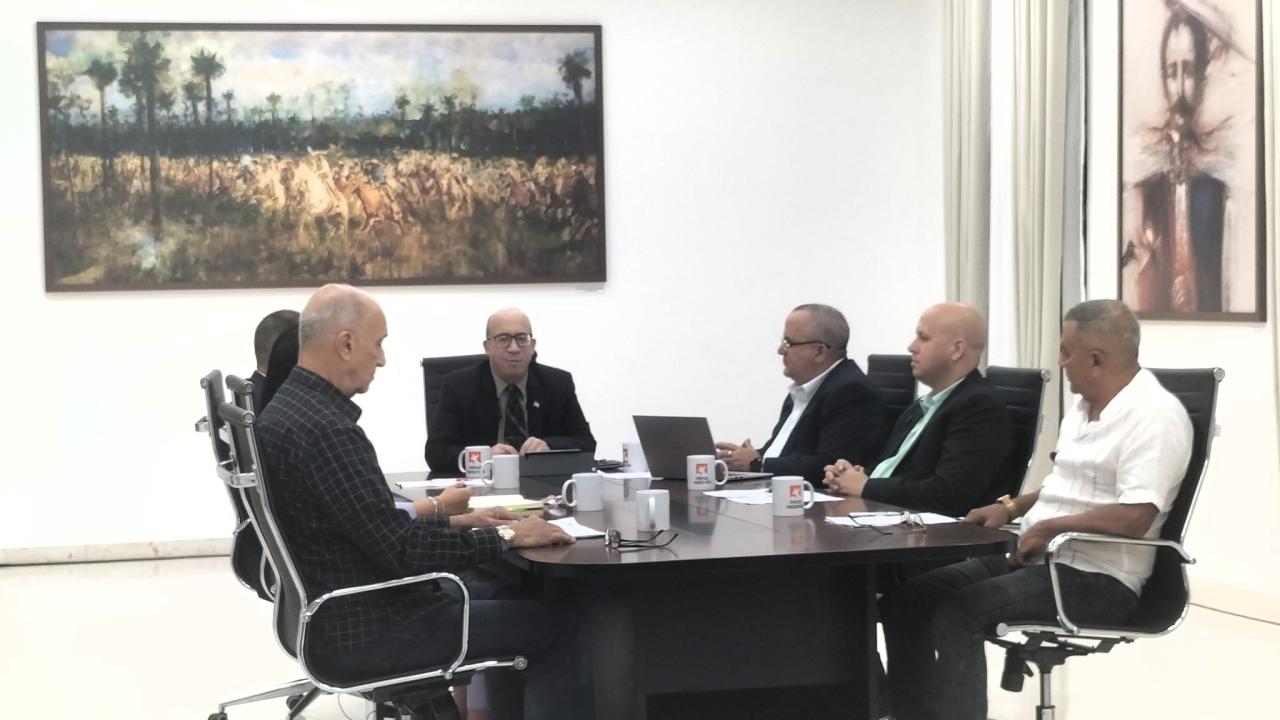A lack of self-criticism, ideological sectarianism, discourse that avoids terms such as 'crisis' to describe the Cuban economic and social reality, is what the 9th Plenary Session of the Communist Party of Cuba's (PCC) Central Committee will bring us, as is evident from the remarks of the regime's members on a recent edition of Mesa Redonda (Round Table) addressing the subject.
According to economist Pedro Monreal, the program on Monday, December 9 "was an early confirmation of the irrelevance of the Plenary Session of the PCC's Central Committee for the effective management of the country's severe economic, social and moral crisis."
At the beginning of the event Jorge Luis Broche Lorenzo, a member of the Secretariat and head of the Central Committee's Economic Productive Department, spoke of "the difficult economic and social circumstances that Cuba is going through," which he attributed to "the multidimensional crisis that affects nations, on a global scale," in addition to "the natural disasters that have taken place in recent months in the country," Washington's embargo, and the regime's inclusion on the list of state sponsors of terrorism, these last two being Havana's favorite scapegoats to shirk responsibility for its failed policies.
Broche Lorenzo described the situation with the national electricity system as "tense" ("chaotic" would be more accurate, with total disconnection on three occasions in less than two months) and cited the country's shortages of fuel, goods, services, and medicines, and high prices. According to the official, these are "latent realities" in Cuban society, which "not only entail distress for the population, but also constitute obstacles to the recovery of the national economy."
The authorities said that the "central axes and pillars of the plenary session" will be a plan to "correct distortions and promote national development" and advance proposals for the 2025 economic plan, budget and the CCP's experiences in strengthening business management, along with addressing social deviations and ideological strengthening."
Yoerky Sánchez Cuéllar, president of the Ideological Commission of the Central Committee and editor-in-chief of the regime's newspaper, Juventud Rebelde, said that there is "an exacerbation of social differences, abusive prices, tax evasion, problems in the relationship between the state and non-state sectors, insensitivity by some officials, limited use of criticism and self-criticism, and flaws in the exercise of social communication and the bureaucracy."
He admitted that there is a "feeling that nothing can be done" among people; that is, "apathy, indolence and resistance to change."
In Pedro Monreal's opinion, the speakers on Mesa Redonda "demonstrated a partisan absence of self-criticism regarding the essential causes of the economic policy's failure. They evaded the concept of a crisis, glossing the situation over by referring, nondescriptly, to 'difficult economic and social circumstances.'”
"With a misdiagnosis, more due to political sectarianism than to technical incompetence, the government 'projections' (the new euphemism for their economic program’s targets) will never be realized," the analyst predicted.
"A political party that promotes economic policies that result in Cuba's brutal gutting of wages cannot be considered one that manages transformation in favor of popular welfare," he lamented.
The analyst stated that, "by maintaining, essentially, a central planning scheme, with half-measures that do not transcend the basic format of the 'socialist' reform of the mid-1960s, the Cuban Government is bound to fail in the fulfilment of its 'projections.'"
"No economic reform undertaken by ruling Communist parties in the USSR and Europe in the 1980s was successful because they, essentially, maintained centralized planning. The 'conceptualization' and 'projections' in Cuba are destined to replicate that type of failure," Monreal said.
According to the economist, "the official 'projections' in Cuba follow the same pattern as the failed 'socialist' economic reforms of the 1980s. Economic reform is a political process, and averting this trajectory would require political decisions that do not seem to interest the Communist Party of Cuba."
A recent Government decision, rescinding the right to sell wholesale to MSMEs in Cuba, is the latest example of a policy indicative of an aversion to change and a need for control.
Experts have predicted that the new regulations could aggravate the Cuban economic and social crisis and have described them as "political suicide." On Tuesday, the United States Government expressed its concern in this regard.
"The measures adopted by the Cuban government on December 5 will further shackle the country's independent entrepreneurs and worsen food insecurity on the island. Cubans deserve better," Brian A. Nichols, Undersecretary of State for Western Hemisphere Affairs, wrote on X.
In his blog on Facebook "The State As Such" the Cuban economist Pedro Monreal noted, that "exclusively private wholesale trade had been prohibited since August in Cuba. Resolution 56 now outlines its implementation under the ruse of 'ordering', but it is a blow to market relations and discriminates against private activity."
According to the expert, the Cuban regime's bureaucracy seems to consider it "feasible to kill several birds with one stone: take advantage of private cash to re-politicize wholesale supply, and undercut competitors, enabling State wholesale companies to increase their market power and profitability."
"Resolution 56 turns non-State actors, who have liquidity and flexibility, and who today engage in most retail trade, into a large mass of customers captive to State wholesale companies, which are devoid of cash and, in many cases, inefficient," he says.
"It seems that someone wants to steer Cuba straight into economic suicide. In reality, this is an act of political suicide, " Carlos Alzugaray, a former diplomat and spokesman for the Cuban regime, said on X.
Alzugaray made his comment in a post by Ricardo Herrero, executive director of Cuba Study Group, which favors business between the US and the island. Herrero also shared a comment by Ernesto Moreira Sardiñas, a Professor of Law at the University of Havana.
"We are putting things on a silver platter for Trump and Rubio. "They can't even believe it..." the professor wrote, referring to the government team that will arrive at the White House next January.
